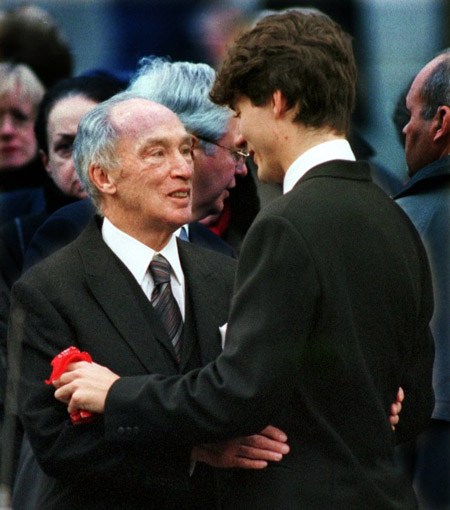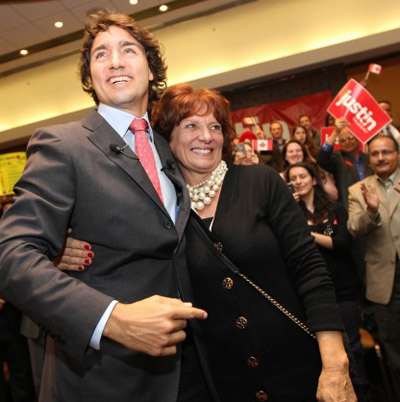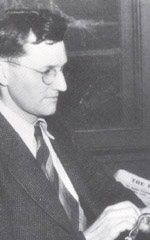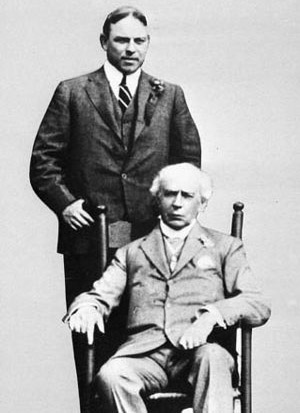When the real Justin Trudeau stands up will he look at least a little like William Lyon Mackenzie King?
May 9th, 2013 | By Randall White | Category: In BriefLike many others, I am still trying to figure out new Liberal Party of Canada leader Justin Trudeau, and what he may or may not mean for our Canadian future.
I note such recent headlines as : “Quebec undergoing a Liberal revival, new poll finds” ; “Justin Trudeau Liberals jump to seven-point lead over Tories, poll suggests” ; “Justin Trudeau’s ‘honeymoon with Canadians’ could last a long time” ; and “Conservative attack ads aren’t doing much damage to Justin Trudeau’s Liberals, poll finds.”
Then I ponder : “Liberals raise $1M in first 3 weeks under Justin Trudeau”; and “Justin Trudeau’s cargo shorts overshadow Liberal Party success story.”
And then I delve into : “Justin Trudeau offers key glimpses of next Liberal platform” ; “Justin Trudeau praises Alberta premier for Keystone efforts” ; and “Justin Trudeau is making a mistake on Senate reform” (from this very website, this past February). And then (from the Hill Times, Tuesday, May 7, 2013) I contemplate these provocative sentences: “Justin Trudeau, boy king … Don’t hold your breath. The real Justin Trudeau is the empty vessel interviewed by Peter Mansbridge, and that means the party is in the hands of the same hypocritical apparatchiks who wrote–and then casually betrayed–the rosy promises in Jean Chrétien’s 1993 Red Book. Welcome back to the future.”
I am certainly not on the kind of Ottawa grapevines that presumably nourish the Hill Times. But as I think about all these things, I am suddenly struck by the thought that there just may be a historical Canadian prime minister, who can tell us something interesting about the kind of Canadian politician Justin Trudeau is shaping up to be.
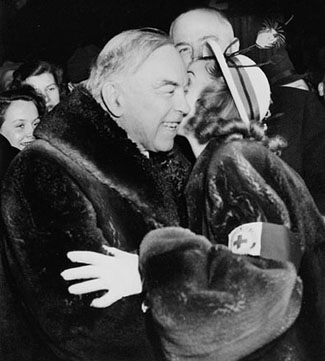
Prime Minister William Lyon Mackenzie King helps figure skater Barbara Ann Scott celebrate her 1948 gold medal at the Winter Olympics.
The person I have in mind is certainly not Justin Trudeau’s famous father, Pierre Elliott Trudeau (who gave us the Charter of Rights and Freedoms and the Constitution Act, 1982, and all that). It is someone who most of us alive today cannot really claim to remember, in the flesh, as it were. This person still holds the record for longevity in office in Ottawa. He has been described by one author as The Incredible Canadian, and by another as “the representative Canadian, the typical Canadian, the essential Canadian, the ideal Canadian, the Canadian as he exists in the mind of God.” In case you haven’t already guessed, I am talking about William Lyon Mackenzie King, grandson of the leader of the Upper Canada Rebellion of 1837, William Lyon Mackenzie, and Prime Minister of Canada, 1921—1926, 1926—1930, 1935—1948.
Has Justin Trudeau ever read Frank Scott’s poem about Mackenzie King?
At first glance, of course, it could also easily enough be said that it is hard to think of a historical Canadian prime minister who is less like Justin Trudeau than Mackenzie King. Prime Minister King, eg, was a lifelong bachelor unusually close to his mother. Justin Trudeau has a striking wife and two children – an almost model young Canadian family.
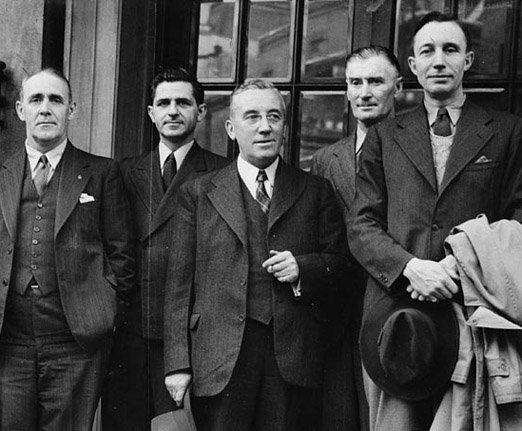
Federal CCF Party delegation attending the conference of Commonwealth Labour Parties in London, England September 1944. From Left to right : Clarie Gillis, MP for Cape Breton South; David Lewis, National Secretary; M.J. Coldwell, National Leader, MP for Rosetown-Biggar ; Percy E. Wright, MP for Melfort, Saskatchewan; and Frank Scott, National Chairman.
Similarly, whatever else Justin Trudeau may lack, he has some kind of semi-magical charisma coming out his ears. Some say it is just his father’s name that accounts for his almost miraculous performance as Liberal leader in recent opinion polls. But people my age remember the old “Trudeaumania.” Trudeaumania II, with the provocative Sophie Gregoire Trudeau and Xavier Trudeau and Ella-Grace Trudeau in tow from the start, is quite different. And, whatever else again, no one would ever accuse William Lyon Mackenzie King of suffering from any kind of charisma. (According to more than a few reports from now vanishing generations: “No one ever admitted to actually voting for Mackenzie King.”)
Yet as I ponder everything that Justin Trudeau has done – or more importantly not done – as he has risen to the perhaps still high enough office of leader of the Liberal Party of Canada – I finally seem to hear echoes of the William Lyon Mackeznie King memorably captured in the poem by F.R.Scott, that Canadian political junkies of my own persuasion still remember:
How shall we speak of Canada,
Mackenzie King dead?
The Mother’s boy in the lonely room
With his dog, his medium and his ruins?
He blunted us.
We had no shape
Because he never took sides,
And no sides
Because he never allowed them to take shape.
He skilfully avoided what was wrong
Without saying what was right,
And never let his on the one hand
Know what his on the other hand was doing.
The height of his ambition
Was to pile a Parliamentary Committee on a Royal Commission,
To have “conscription if necessary
But not necessarily conscription,”
To let Parliament decide –
Later …
Or what about Bruce Hutchison from Victoria and Vancouver on The Incredible Canadian?
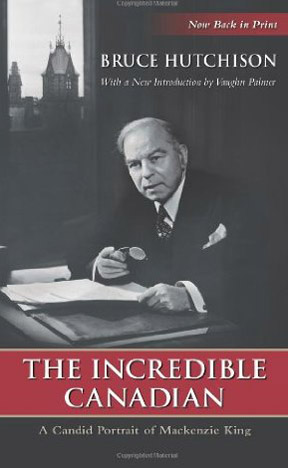 There is certainly some truth to all this. But it is also worth underlining, I think, that Frank Scott was a Montreal law professor, poet, and social democratic activist, who never really bought into the peculiar Canadian political magic of William Lyon Mackenzie King.
There is certainly some truth to all this. But it is also worth underlining, I think, that Frank Scott was a Montreal law professor, poet, and social democratic activist, who never really bought into the peculiar Canadian political magic of William Lyon Mackenzie King.
For a more positive take on the long-lived Prime Minister King, who so “skilfully avoided what was wrong / Without saying what was right,” you have to consult Bruce Hutchison’s 1952 classic, The Incredible Canadian – A candid portrait of Mackenzie King : his works, his times, and his nation – still probably the best book ever written on its subject.
As I think of all this, another related point strikes me. Although technically born in eastern Ontario, at an early age Bruce Hutchison moved with his family to Victoria, BC, where he was educated and grew up. And although he spent much of his earlier adulthood in Ottawa, from his 50s onward his career was based in Victoria and then Vancouver. And it is no accident that The Incredible Canadian was happily republished in 2011 – almost 20 years after Hutchison’s death – with a new introduction by Vaughn Palmer of the Vancouver Sun.
It may also be no accident that Justin Trudeau is often said to be more his mother’s than his father’s son. And his mother was herself born and raised in Vancouver. Justin himself has “a Bachelor of Education degree from the University of British Columbia.” And : “After graduation, he worked as a social studies and French teacher at West Point Grey Academy and Sir Winston Churchill Secondary School in Vancouver.”
Justin Trudeau’s Papineau riding and the Mackenzie-Papineau Battalion
There is, somewhat arguably at any rate, some parallel symbolism in the name of the Montreal riding Justin Trudeau now sits for in the Canadian House of Commons.
He has represented the so-called “ largely lower-middle-class” riding of Papineau north of downtown Montreal since the 2008 election. It “includes a contingent of voters who have historically supported the pro-independence Bloc Québécois.” But except for the brief two years between 2006 and 2008, the riding and its antecedents have consistently returned Liberals in federal elections since the 1950s. And it is named after Louis Joseph Papineau – leader of the Lower Canada Rebellion of 1837—38.
Louis Joseph Papineau (for those who may have forgotten) was the Lower Canada (ie Quebec)Â analogue/colleague of William Lyon Mackenzie, leader of the Upper Canada (ie Ontario) Rebellion of 1837. And (once again) William Lyon Mackenzie was the grandfather of William Lyon Mackenzie King. So … you may of course say “So What.” But there is some at least minor nominal symbolism here – Papineau, Mackenzie, Mackenzie King, Trudeau, etc, etc.
Various forms of cold water may no doubt be cast on this symbolism, especially if you push Mackenzie and Papineau into the 20th century universe of the Mackenzie-Papineau Battalion – the independent Canadian contingent in the Spanish Civil War of the later 1930s. Just to say the very least, the government of Justin Trudeau’s father would not accept a December 1980 proposal by then New Democratic Party MP Bob Rae, to grant official veteran status “to Canadians who fought on the side of Republican Spain” in the 1930s. Even so, if Papineau’s colleague Mackenize could ultimately beget Mackenzie King, why couldn’t Pierre Trudeau beget a son who will finally most resemble Mackenzie King (while representing the riding of Papineau in the Canadian House of Commons)?
Could the Canadian federal election of 2015 bear some kind of vague family resemblance to the election of 1921?
A very final historical analogy may or may not be slightly more (or less) convincing. William Lyon Mackenzie King first became Prime Minister of Canada as a result of the December 6, 1921 federal election. And there seems some slight prospect that the next Canadian federal election today in 2015 – in which Justin Trudeau may or may not first become Prime Minister of Canada – could bear a few vague family resemblances to the election of 1921.
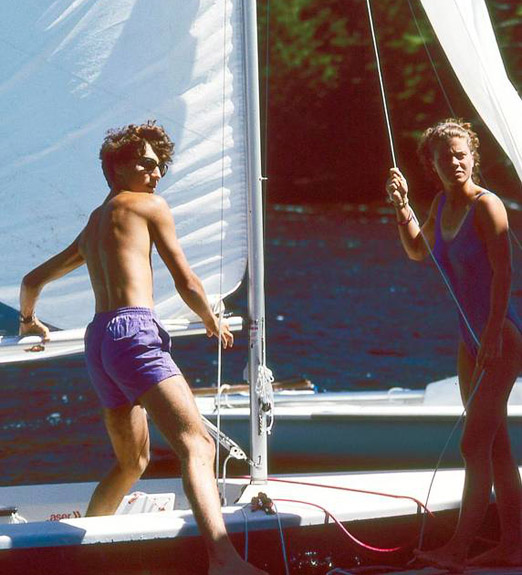
An 18-year-old Justin Trudeau with fellow counsellor Marie Clement readying a sailboat at Camp Ahmek in Algonquin Park. Trudeau worked at the camp as a counsellor in 1992.
By 1921, eg, Canada had at least been governed by Conservative prime ministers for some 10 years, since the defeat of the Laurier Liberals in the “reciprocity” or Canada-US free trade election of 1911. (In 1917 the issue of conscription or compulsory military service in the First World War, 1914—1918, prompted some Liberals to briefly join Conservative Robert Borden’s new “Unionist” government.) By the time of the 2015 federal election Canada will have been governed by the Stephen Harper Conservatives for more than nine years.
The Canadian federal election of 1921 marked the first time the majority of Canadian women could vote. One of its unique results was that Agnes Macphail from Grey County, Ontario became the first woman elected to the Canadian House of Commons. Somewhat more importantly, in some respects, the Mackenzie King Liberals won 116 seats in a 235-seat House – just short of a bare majority. And King would form Canada’s first minority government.
Still more intriguingly again, a new rural-based Progressive Party with 24 seats in Ontario and 37 seats in the three Prairie Provinces of Manitoba, Saskatchewan, and Alberta, actually won more seats than the Conservatives. The Progressives were Canada’s first major third party. And Mackenzie King’s new minority government would lean on them (many of whom were, in King’s view, “just Liberals in a hurry”) for support in passing legislation.
At the same time again, the conscription issue during the First World War had isolated Quebec in federal politics. Mackenzie King, however, had remained loyal to Laurier’s anti-conscription policy and did not join the “Unionist” Liberals who supported Robert Borden in 1917. He was rewarded in 1921 with all 65 of Quebec’s 65 seats. And “the Liberal victory with Quebec support in 1921 meant that French Canada would have a more prominent place in Canadian politics.”
In the spring of 2013, at any rate, it seems plausible enough that Justin Trudeau’s Liberals could emerge with more seats than any other party in 2015 – but still fall short of a majority government. And his first government could wind up depending on Thomas Mulcair’s New Democrats to pass legislation – just as Mackenzie King depended on the Progressives in the first half of the 1920s.
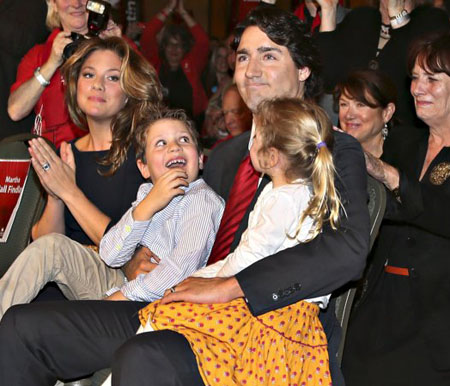
Justin Trudeau, his wife Sohpie Gregoire (L), son Xavier (C) and daughter Ella-Grace react after he was named the new leader of the Liberal Party of Canada in Ottawa April 14, 2013. REUTERS/Christinne Muschi.
Moreover, if it is true that Quebec is “undergoing a Liberal revival, new poll finds, as PQ slump drags on” (and even if this is only half true), the accession of Justin Trudeau from the Montreal riding of Papineau to the office of Prime Minister of Canada would almost certainly mean “that French Canada would have a more prominent place in Canadian politics” – after more than nine years in the wilderness of Stephen Harper’s Canada.
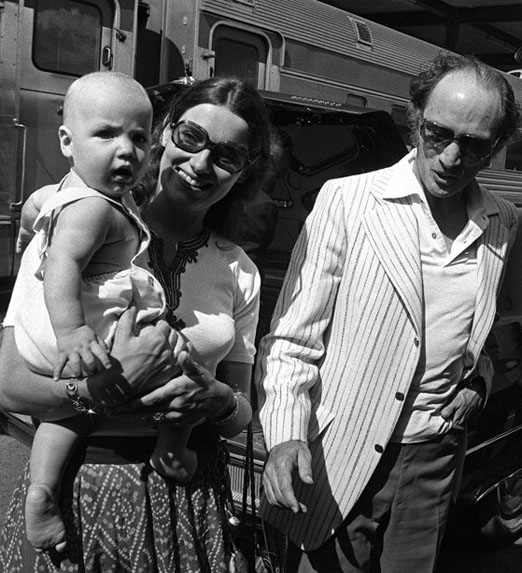
Seven-month-old Justin Trudeau looks around impatiently in his mothers arms as Prime Minister and Mrs. Trudeau prepare to board the train Wednesday July 20, 1972 for a summer vacation on the west coast. (CP PHOTO/ Peter Bregg).
Of course, none of this may ever happen. And who alive today really remembers the Canadian federal election of 1921? (Anyone who voted then would be at least 113 years old now!) Yet it is at least somewhat provocative to read the historian Ramsay Cook’s account of the 47-year-old new Liberal Party of Canada leader on the eve of the 1921 election: “King appeared to be a man of the new age … His political experience was limited … But his political sense was keen, his ambition unbounded and his sense of mission powerful. He believed he had a divine calling to political leadership and he never forgot that he was the grandson of William Lyon Mackenzie, the rebel leader of 1837.” With not all that many names changed to protect the innocent, this does seem to me a little like today’s Justin Trudeau (who will be 43 years old on the eve of the 2015 election – just three or so years younger than Mackenzie King in 1921!)
